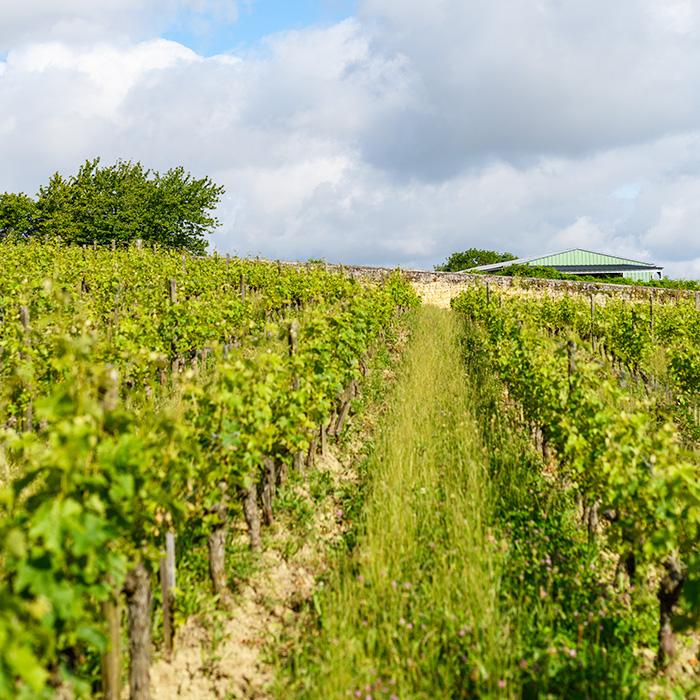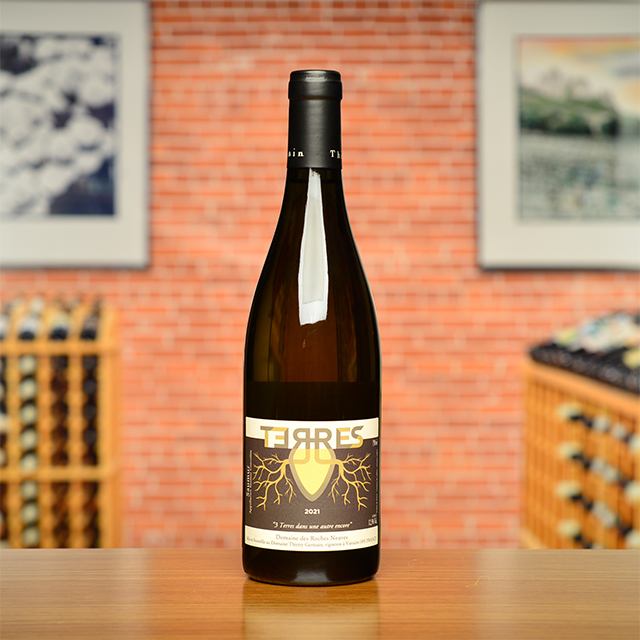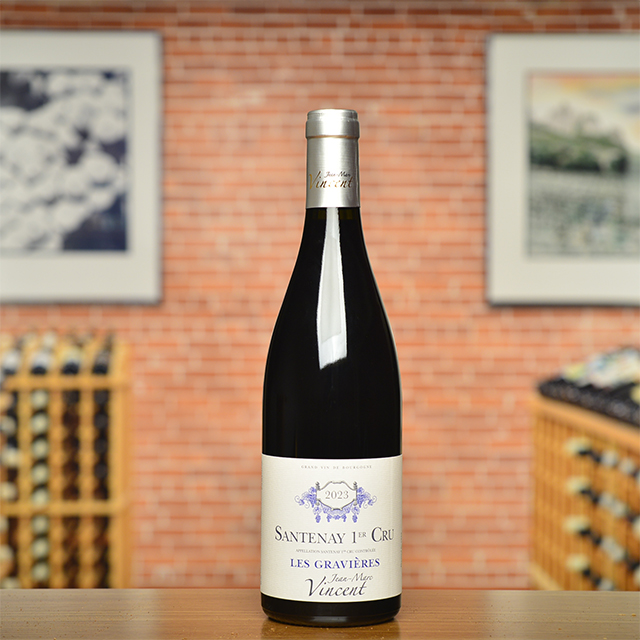Notify me
2020 Saumur Champigny “Clos de l’Échelier”
Thierry Germain

Thierry Germain

Clos de l’Echelier

The stone wall outside the clos
Thierry Germain’s Clos de l’Echelier bottling almost never happened. After putting it up for sale in 2012, the local Saumurois owner of the Clos de l’Echelier vineyard did not initially want to sell it to Germain, who grew up outside of the Loire, in a Bordeaux wine family. Thierry, however, was no carpetbagger and he convincingly communicated his extraordinary devotion to his adopted region. He told the owner how he had toiled in Saumur for two decades already and how he now farmed biodynamically and organically, with the utmost respect for the vines. He expounded on his aim to help bring the Loire Valley to its deserved place alongside the great wine regions of the world. Finally, he told the owner one other thing that might have sealed the deal.
Years before, Thierry and his wife had driven past the clos, which dates back 300 years, and had fallen in love with it immediately. It is called the Clos de l’Echelier—the ladder enclosure—because of the way the vineyard slopes, making the stakes look like a ladder from afar, and because it is surrounded by an old stone wall. Thierry believes strongly in “le bon sens paysan”—farmer’s wisdom—and he argues that hundreds of years ago, farmers identified the best vineyards and encircled them to mark the high quality. Another special feature of the site was the abundance of old cherry and oak trees in and around the clos, which Thierry says boosts the biodiversity and health of the vineyard. “[The trees’ presence] is the only element that gives light to the soil. Without light, there is no life.” After seeing it, he told his wife that one day he would buy this magical vineyard for her. Moved, the owner ultimately sold it to Thierry.
The result of Thierry’s purchase is extraordinary. In general, his reds are fresh, ethereal, and expand the possibilities of Cabernet Franc, without abandoning or overriding the variety’s integrity. They appeal to both Cabernet Franc lovers and those who claim not to like the grape. The Clos de l’Echelier might be his best example of this. Year after year, this cuvée from 40-year-old vines planted in clay and limestone is Thierry’s most mineral rouge, whose chalky finish leaves your palate cleansed and salivating.
—Tom Wolf
| Wine Type: | red |
| Vintage: | 2020 |
| Bottle Size: | 750mL |
| Blend: | Cabernet Franc |
| Appellation: | Saumur-Champigny |
| Country: | France |
| Region: | Loire |
| Producer: | Thierry Germain |
| Winemaker: | Thierry Germain |
| Vineyard: | 40 years, 2.5 ha |
| Soil: | Clay, Turonien Supérieur Limestone |
| Aging: | Aged in 1200L foudre and 600L demi-muid for 12 months |
| Farming: | Biodynamic (certified) |
| Alcohol: | 13.5% |
More from this Producer or Region

2020 Saumur-Champigny “Franc de Pied”
France | Loire
This Saumur Champigny is electric and alive, from the first scent of roses on the nose to the juxtaposition of textured tannic grip and sheer weightlessness on the palate.

2022 Saumur Champigny “Terres Chaudes”
France | Loire
Thierry has perfected the art of coaxing this Cabernet Franc’s soulfulness and elusive finesse into bottle.

2024 Saumur Blanc “L’Insolite”
France | Loire
Made from nearly hundred-year-old vines, this a great initiation into the world of Thierry’s white wines.

2020 Saumur Blanc “Clos Romans”
France | Loire
Thierry’s Saumur Blancs are bone-dry, high-acid, mineral Chenin Blancs that drink like Chablis young and take on weight slowly over time.

2021 Saumur Blanc “Terres”
France | Loire
Redolent of almonds, honey, and a wide range of citrus, this kaleidoscopic Chenin finishes with a faint tannin, making it ideal alongside sushi, roast chicken, or a hard and flavorful cheese like Comté.

2022 Saumur-Champigny “Les Mémoires”
France | Loire
Sourced from 110+ year-old vines, this is hands-down one of the best Cab Francs being made in the Loire Valley today.

2020 Saumur Champigny “Outre Terre”
France | Loire
Outre Terre is a tiny production of Cabernet Franc fermented in amphora and aged in barrel.

2018 Saumur Blanc “L’Échelier”
France | Loire
Burgundian-like in character from its time spent in barrel, the laser-like acidity will become even more enticing with some age.

2021 Saumur-Champigny “Les Mémoires”
France | Loire
Sourced from 110+ year-old vines, this is hands-down one of the best Cab Francs being made in the Loire Valley today.

2019 Saumur Blanc “Le Clos du Moulin”
France | Loire
Thierry Germain’s meticulous process coaxes out the delicate and aromatic side of Chenin Blanc—think jasmine, honeysuckle, and peach.
About The Producer
Thierry Germain
Thierry relocated to the Loire from Bordeaux in the early 1990s, and soon fell under the influence of his spiritual father, Charly Foucault of Clos Rougeard. Thierry would ultimately convert his entire domaine to biodynamic viticulture, which was the equivalent of his wine epiphany. Listening and observing his plants, allowing them to guide him, revolutionized his way of thinking. Thierry harvests on the relatively early side to preserve fresh, vibrant fruit. His goal is to produce Cabernet with purity, finesse, and drinkability, while avoiding rusticity, vegetal character, and hard tannins. When it comes to his Chenin, he makes bone dry, high acid, mineral wines that drink like Chablis young and take on weight slowly over time. Aging takes place in large oval foudres (for the whites) and round foudres and demi-muids (for the reds) in Thierry’s frigid tuffeau cellars below his winery in Varrains. His incredibly diverse terroirs are translated with utter clarity and precision.
About The Region
Loire

The defining feature of the Loire Valley, not surprisingly, is the Loire River. As the longest river in France, spanning more than 600 miles, this river connects seemingly disparate wine regions. Why else would Sancerre, with its Kimmeridgian limestone terroir be connected to Muscadet, an appellation that is 250 miles away?
Secondary in relevance to the historical, climatic, environmental, and cultural importance of the river are the wines and châteaux of the Jardin de la France. The kings and nobility of France built many hundreds of châteaux in the Loire but wine preceded the arrival of the noblesse and has since out-lived them as well.
Diversity abounds in the Loire. The aforementioned Kimmeridgian limestone of Sancerre is also found in Chablis. Chinon, Bourgueil, and Saumur boast the presence of tuffeau, a type of limestone unique to the Loire that has a yellowish tinge and a chalky texture. Savennières has schist, while Muscadet has volcanic, granite, and serpentinite based soils. In addition to geologic diversity, many, grape varieties are grown there too: Cabernet Franc, Chenin Blanc, Sauvignon Blanc, and Melon de Bourgogne are most prevalent, but (to name a few) Pinot Gris, Grolleau, Pinot Noir, Pineau d’Aunis, and Folle Blanche are also planted. These myriad of viticultural influences leads to the high quality production of every type of wine: red, white, rosé, sparkling, and dessert.
Like the Rhône and Provence, some of Kermit’s first imports came from the Loire, most notably the wines of Charles Joguet and Château d’Epiré—two producers who are featured in Kermit’s book Adventures on the Wine Route and with whom we still work today.
More from Loire or France
2020 Vin de France Rouge Cabernet Franc “Huguette”
Grange Saint Sauveur France | Loire
Touraine “Fines Bulles”
Domaine de la Chanteleuserie France | Loire
2024 Muscadet Sèvre et Maine Sur Lie
Domaine Michel Brégeon France | Loire
2024 Saumur Blanc “L’Insolite”
Thierry Germain France | Loire
2022 Chinon Blanc
Bernard Baudry France | Loire
2024 Vouvray “La Dilettante”
Catherine & Pierre Breton France | Loire
2024 Menetou-Salon Blanc “Le Prieuré”
Prieuré de Saint Céols France | Loire
2017 Jasnières “Chant de Vigne”
Christine de Mianville France | Loire
2024 Pouilly-Fumé “Vieilles Vignes”
Régis Minet France | Loire
2024 Gros-Plant du Pays Nantais
Domaine Michel Brégeon France | Loire
2021 Vin de France Blanche
Domaine Michel Brégeon France | Loire
2020 Saumur-Champigny “Franc de Pied”
Thierry Germain France | Loire
2020 Vin de France Rouge Cabernet Franc “Huguette”
Grange Saint Sauveur France | Loire
Touraine “Fines Bulles”
Domaine de la Chanteleuserie France | Loire
2024 Muscadet Sèvre et Maine Sur Lie
Domaine Michel Brégeon France | Loire
2024 Saumur Blanc “L’Insolite”
Thierry Germain France | Loire
2022 Chinon Blanc
Bernard Baudry France | Loire
2024 Vouvray “La Dilettante”
Catherine & Pierre Breton France | Loire
2024 Menetou-Salon Blanc “Le Prieuré”
Prieuré de Saint Céols France | Loire
2017 Jasnières “Chant de Vigne”
Christine de Mianville France | Loire
2024 Pouilly-Fumé “Vieilles Vignes”
Régis Minet France | Loire
2024 Gros-Plant du Pays Nantais
Domaine Michel Brégeon France | Loire
2021 Vin de France Blanche
Domaine Michel Brégeon France | Loire
2020 Saumur-Champigny “Franc de Pied”
Thierry Germain France | Loire
Kermit once said...

Kermit once said...
Let the brett nerds retire into protective bubbles, and whenever they thirst for wine it can be passed in to them through a sterile filter. Those of us on the outside can continue to enjoy complex, natural, living wines.
Inspiring Thirst, page 236
Promo Code Terms
There are two types of promo codes
1) a code that gives you a percentage off your order
2) a code that gives you a dollar amount off your order
How do promo codes or coupon codes work?
When you place an order with a percentage coupon code, the discount only applies to discount eligible items. An eligible item typically is a product that does not already have a discount. Sampler packs that already have discounts applied to them do not count towards the minimum of 12 eligible items. In your shopping cart, you'll see percentage discounts next to each bottle.
When you place an order with a dollar amount code, the dollar amount is added to your discount. In your shopping cart, the dollar amount is subtracted from your total, and does not show next to each bottle.



















